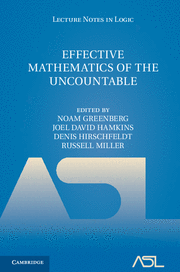Classical computable model theory is most naturally concerned with countable domains. There are, however, several methods – some old, some new – that have extended its basic concepts to uncountable structures. Unlike in the classical case, however, no single dominant approach has emerged, and different methods reveal different aspects of the computable content of uncountable mathematics. This book contains introductions to eight major approaches to computable uncountable mathematics: descriptive set theory; infinite time Turing machines; Blum-Shub-Smale computability; Sigma-definability; computability theory on admissible ordinals; E-recursion theory; local computability; and uncountable reverse mathematics. This book provides an authoritative and multifaceted introduction to this exciting new area of research that is still in its early stages. It is ideal as both an introductory text for graduate and advanced undergraduate students, and a source of interesting new approaches for researchers in computability theory and related areas.
Many of the authors whose work appears in this volume were also involved in the Effective Mathematics of the Uncountable conferences EMU 2008 and EMU 2009, held at the CUNY Graduate Center.


